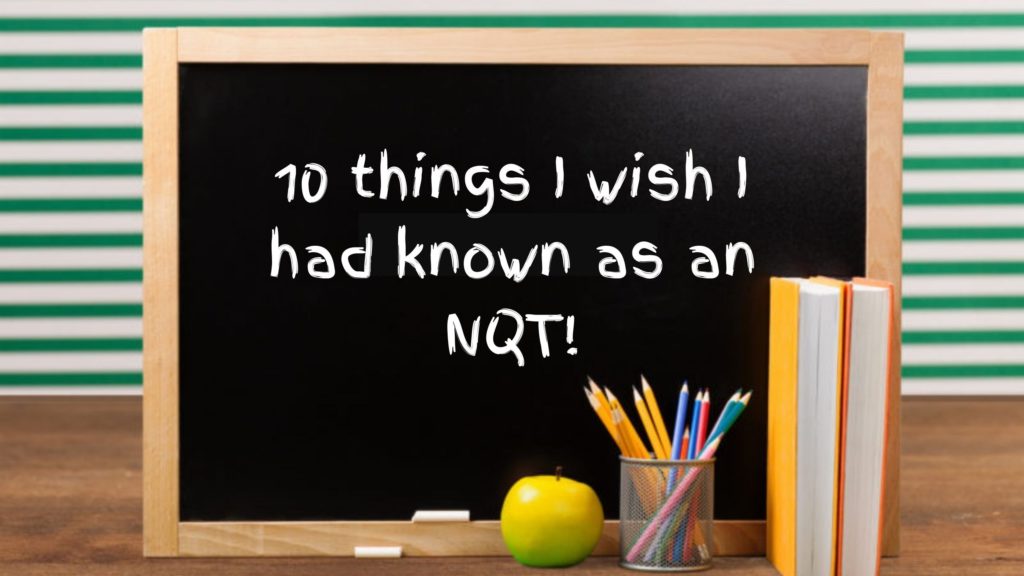Surviving your first week as an NQT

September is the official start month of your life as an NQT! Of course you have been in school in August to prep the classroom and for induction days in June and July – but this is when your contract as a newly qualified teacher starts.
You will be feeling excited, anxious and nervous all at the same time. No need to do daily evaluations and keep evidence against the teaching standards. Lesson plans should be easier to write. Hopefully, you will have parallel teachers or other teachers in your department to support you with planning and resources.
Now you will have a mentor who you can talk to openly and professionally and an NQT Induction mentor who will support and develop you using the teaching standards. The best part of this is that you are allowed to go it alone – you are the boss!
There will be no teaching mentor looking over your shoulder and doing every-day checks. You will still be judged against the teaching standards – all teachers are, no matter how experienced you become.
However, you will now have your own class of 30 pupils and your own classroom. Nothing beats that sense of freedom. You will surprise yourself when you hear the words, Mr or Ms So and So’s class in assemblies or being greeted by eager parents.
When you are bringing your class in from the playground or taking your first form session as a secondary teacher – you will pinch yourself and think, “Is this really me? Just last September, I was starting my teacher training course!” How time flies!

The weekend before the start of school can be nerve wracking. Relax and try to do things that keep your mind off things. Most schools usually have one or two inset days. This is time for training, networking and getting things – “September ready” and prepared for the coming year!
- Secondary schools use the first week to greet, in particular, Y12s into sixth form and also fresh faced, nervous but very excited Y7s.
- In primary schools, home visits for nurseries and Reception inductions will commence for 3 and 4- year olds. A busy time for all schools!

The Night Before an Inset Day
The night before the INSET day, sit down for half an hour and make a list of things you want to achieve and prioritise. There will be so many things you’ll want to do! Have your lunch prepared as the first day for NQTs can be daunting and before you know it – you have reached 5pm with no lunch!
You don’t want to find yourself starving, exhausted and with a blistering headache. Have a planning folder with dividers and a note book.
Most people have digital folders now – but somehow on inset days, staff seem to be given a plethora of information that does come in handy as time goes on.
It is also useful to set up an NQT folder where you can put your notes and observations. On the day of the INSET day, go in slightly early.
You will see the familiar friendly faces that you met in the Summer term. Some you will have met if you came in during the late August prep.
Smile – the school chose you! You are worth it!
Get to know staff and try to spend breaks and lunches in the staffroom. You will soon feel at home. Try to get as much done on the first INSET day.
On the second inset day, if you have one, you want to leave school- the latest by 5pm. If you have only one inset day, it is crucial that your classroom is ready for teaching and learning.
Pencil pots should be filled with pencils, exercise books with labels piled up ready to hand out and display boards backed. Your key headings and signs need to be up and should be a mixture of information using handwriting and print.
Doing so will ensure that both you, parents and the children can get to know each other quickly. Check where your class will line up- if you are a primary teacher.
Have a name badge yourself and double check that you have the all-important fob.
The amount of times teachers can get stuck in the playground because they can’t enter the school building as they don’t have the pin or fob to the security gate is much more frequent than you realise!
It just leads to behaviour issues and a loss of teaching and learning time.
“…being a teacher is hard enough and you should not be on call 24/7”
Another thing to check, certainly by the end of the first week – is what happens during fire drills. Try not to get caught up in too many long meetings – you are a busy person with things to do!
You really don’t want to take things home to do! The night before you start teaching, go through your speech to the class, the schools’ safeguarding and behaviour policies and your own class rules and expectations. Think about how you will deal with a child who may be difficult from the start.
Go through what lessons you will teach and put all these together on a clipboard. Spend only an hour doing this and then switch off. Have fun with loved ones and friends. Avoid looking at emails etc. especially if they are linked to your phone as they don’t allow you to relax.
It might seem patronising or I am telling you to suck eggs – but in the moment, these things can be forgotten- especially when you are in charge of 30 children who may be boisterous from the start.
Reflect, relax and be prepared for the first day!








Responses